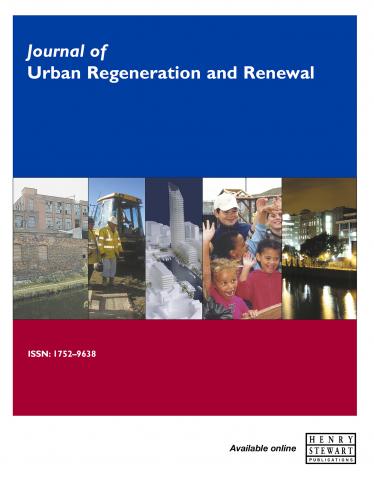"JPSS has articles that make you really think about payments and how they affect commerce and society."
Call for Papers
Call for Papers - Journal of Urban Regeneration & Renewal
Submission Deadline: 30th June 2025
The Editor, Editorial Board and Publishers of Journal of Urban Regeneration & Renewal are currently welcoming the submission of articles by practitioners and papers by academics on the following subjects:
1. New sources of finance for urban regeneration
How do cities develop new funding sources for capital, transportation and infrastructure improvement from the public and private sectors? What is the role of impact funding, climate finance, municipal bonds etc.?
2. Addressing regional inequality and economic growth
Best practices in industrial strategy, infrastructure, transport, community participation and cohesion, local government, housing development, and in the transition to net zero. What are the interventions in the skills market required to tackle inequality and economic underperformance? How can the negative externalities of phased-out industries be minimised (including the green transition) with a people-centred and inclusive approach?
3. City leadership and governance
Political leaders and leadership; the role of city-region mayors; the importance of civic leadership, civil society and public officials.
4. Public-private partnerships in regeneration
What new forms of public-private partnership might be developed to deliver urban regeneration projects?
5. Sustainable development and urban regeneration
What are the relationships and issues that connect contemporary urban regeneration with climate change and its consequences such as flooding, fires, rising temperatures, damage to the natural world? Building climate resilience and priorities for improving infrastructure readiness for net-zero in urban areas.
6. Designing safer and healthy cities
How can urban regeneration be used to make urban environments safer and healthier?
7. The impact of mobility on cities
What are the implications for urban regeneration, planning and infrastructure of the advent of smart technology, autonomous vehicles, electric vehicles, improvements in mass transit and non-motorised transport?
8. Gentrification, housing development and affordable housing
What are the continuing issues related to the impacts of residential and commercial gentrification in cities globally? How can affordable housing regeneration be financed, developed and included as part of urban regeneration schemes? What is the role of the private sector in delivering affordable housing? Is there a continuing role for social rental housing?
9. Retail change and new forms of retail in cities
What are the trends and impacts in terms of changing retail in the age of online shopping and changing consumer behaviour, and the role of pop-up shops, cargo container zones, replacement uses for physical retail stores, and the impacts of the collapse of major retailers in city centres?
10. Coastal regeneration and renewal
What challenges do these communities face because of climate change and storm and sea level rise (SLR) vulnerability? How can mitigation and adaptation strategies help prevent damage by climate change and SLR? What is the future for seaside resorts?
11. Leveraging heritage and the creative industries for urban regeneration
What lessons can be learned for urban development from success in attracting investment, collaboration and building a strong brand?
The copy deadline for this issue is 30th June 2025.
Manuscript submissions and enquiries should be submitted to the Publisher, Julie Kerry. Further, more specific guidance for authors on format and style can be found at: https://www.henrystewartpublications.com/jurr/instructions
Questions about this issue and proposals for papers should be directed to the Publisher, Julie Kerry at julie@hspublications.co.uk


